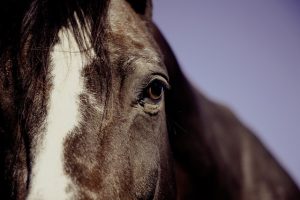NewsDesk @bactiman63
Last week, the University of Florida (UF) Large Animal Hospital reported treating a number of horses with suspected botulism. Botulism is a disease caused by ingestion of botulinum toxin, one of the most potent toxins known.

The website, The Horse reports horses at multiple farms have shown signs consistent with botulism.
Botulism affects all mammals, however, horses are one of the most susceptible species. While botulism is not contagious between horses, it can affect multiple horses on the same property. Sources of botulinum toxin include round bales, alfalfa blocks, soil, and contaminated grains.
Clinical signs of botulism include laying down more than normal, difficulty eating, trembling, low head carriage, and in many cases, death. Prompt treatment with botulism antitoxin is critically important for the survival of affected horses, and any horses noted to have clinical signs consistent with botulism should be examined by their veterinarians immediately.
Subscribe to Outbreak News TV on YouTube
UF officials say botulism is a disease caused by toxins produced by the bacteria Clostridium botulinum. There are 8 different types of botulism that produce toxins of varying potency. Types A, B, and C are the types that usually affect horses. Horses can acquire disease three different ways. The most common route is by eating feed that is contaminated with toxin already in it that has been released by bacteria. This can be from spoiled feed or feed contaminated with an animal carcass. They can also acquire disease by ingesting the bacteria which then sporulate within the GI tract and release toxin inside the animal. This is more common in foals and is due to type B toxin. Rarely, horses can acquire botulism if a wound becomes contaminated with bacteria that then release toxin. The toxin itself acts at the junction between nerves and muscles so that the muscles don’t get the signal to contract when they should, hence the “flaccid paralysis.”
How can I prevent my horse from getting botulism?
Do not feed any obviously spoiled grain, or feed in which any animal carcasses are found (rats, birds, squirrels, etc). Also avoid feeding silage or haylage to horses as, if improperly fermented, it can harbor Clostridial organisms. Do not feed hay from plastic-wrapped bales if the plastic is torn. There is a vaccine against one type of botulism (Type B). This vaccine is given in certain geographic areas (central Kentucky, the mid-Atlantic) to reduce the risk of “Shaker Foal Syndrome.” Mares should be vaccinated with a 3 dose series in the last 3 months of pregnancy. Unfortunately, this vaccine is not effective against other types of botulism.
Florida: Avian influenza confirmed in wild birds
Florida reports 79 animal rabies cases in 2021

